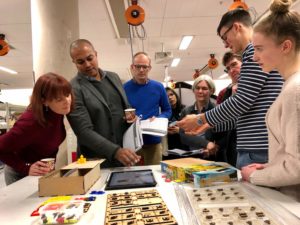Hackcessible 2019 – Taking Co-Design in Healthcare Innovation to the Next Level
Written by: Aejaz Zahid - 20th December 2019
The International Day of Persons with Disabilities was commemorated in Sheffield with a unique awards ceremony, where prizes were given for new assistive technology innovations to address the unmet needs of individuals who may have a visual impairment, a physical disability, a communication impairment or an age related memory challenge.
 The awards ceremony was the climax of over five weeks of intensive engagement between individuals with disabilities from the South Yorkshire and Bassetlaw region and students from The University of Sheffield and Sheffield Hallam University. Bringing together the strengths and resources of both universities in areas such as engineering, computer science, healthcare sciences (e.g. occupational therapy) and product design.
The awards ceremony was the climax of over five weeks of intensive engagement between individuals with disabilities from the South Yorkshire and Bassetlaw region and students from The University of Sheffield and Sheffield Hallam University. Bringing together the strengths and resources of both universities in areas such as engineering, computer science, healthcare sciences (e.g. occupational therapy) and product design.
Hackcessible 2019 began with a challenge event on October 25th, where the four challenge themes were presented by individuals affected by them. These challenges included the lack of game/puzzles for the blind, rain protection for wheelchair users, communication systems for locked-in syndrome and memory support for those with short term memory loss. Eight diverse teams were formed, which included the disabled challenger and students from a range of disciplines. These teams were then put through a series of weekly workshops on the following topics; “Building an Innovation focused Team”, “Human Centred Design”, “CAD for 3D Printing”, “Electronic Prototyping” and “Open Source Innovation Platforms”. The disabled challengers were encouraged to fully participate within the teams during each of these workshops, offering the students a deep understanding and appreciation of the unmet need, while co-designing potential solutions over this time.
The five weeks of workshops, ideation and co-design culminated in a weekend hackathon at the end of November, where students used a fully resourced makerspace (the iForge) at The University of Sheffield to work with their respective challengers to co-create a prototype solution to the challenge. The solutions ranged from purely 3D physical objects to wearable electronic devices to AI powered camera-based software.
These solutions were assessed by a team of judges from the healthcare sector, academia and industry, including our CEO Richard Stubbs, Prof Alison Metcalfe (SHU Dean of the Faculty of Health & Wellbeing), Dr Sue Smith (Faculty of Medicine & Dentistry, U of Sheffield), Philpa Headley-Thakar (Devices for Dignity) and Richard Wheatley (Global Head of Product Testing – Dyson).
All the winning teams are keen to take their ideas forward, with some working towards developing a minimal viable product to explore its commercial potential, while others hope to build an online open source community to further refine and improve their solutions.
Written by Aejaz Zahid, South Yorkshire & Bassetlaw Innovation Hub Director
